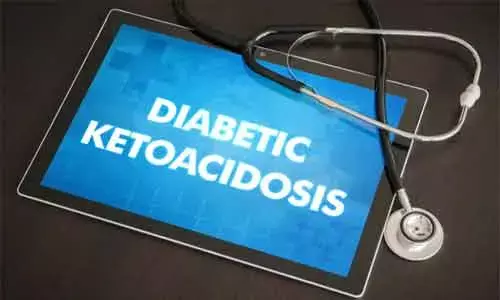- Home
- Medical news & Guidelines
- Anesthesiology
- Cardiology and CTVS
- Critical Care
- Dentistry
- Dermatology
- Diabetes and Endocrinology
- ENT
- Gastroenterology
- Medicine
- Nephrology
- Neurology
- Obstretics-Gynaecology
- Oncology
- Ophthalmology
- Orthopaedics
- Pediatrics-Neonatology
- Psychiatry
- Pulmonology
- Radiology
- Surgery
- Urology
- Laboratory Medicine
- Diet
- Nursing
- Paramedical
- Physiotherapy
- Health news
- Fact Check
- Bone Health Fact Check
- Brain Health Fact Check
- Cancer Related Fact Check
- Child Care Fact Check
- Dental and oral health fact check
- Diabetes and metabolic health fact check
- Diet and Nutrition Fact Check
- Eye and ENT Care Fact Check
- Fitness fact check
- Gut health fact check
- Heart health fact check
- Kidney health fact check
- Medical education fact check
- Men's health fact check
- Respiratory fact check
- Skin and hair care fact check
- Vaccine and Immunization fact check
- Women's health fact check
- AYUSH
- State News
- Andaman and Nicobar Islands
- Andhra Pradesh
- Arunachal Pradesh
- Assam
- Bihar
- Chandigarh
- Chattisgarh
- Dadra and Nagar Haveli
- Daman and Diu
- Delhi
- Goa
- Gujarat
- Haryana
- Himachal Pradesh
- Jammu & Kashmir
- Jharkhand
- Karnataka
- Kerala
- Ladakh
- Lakshadweep
- Madhya Pradesh
- Maharashtra
- Manipur
- Meghalaya
- Mizoram
- Nagaland
- Odisha
- Puducherry
- Punjab
- Rajasthan
- Sikkim
- Tamil Nadu
- Telangana
- Tripura
- Uttar Pradesh
- Uttrakhand
- West Bengal
- Medical Education
- Industry
Covid 19 Infection led to ketoacidosis in diabetes patient: case report

People with diabetes are among those high risk categories that can have serious illness if they get infected with Covid 19 virus. The most challenging complication of diabetes is diabetic ketoacidosis.But data on diabetic ketoacidosis (DKA) in Covid-19 infection is scarce.
Researchers have reported a case of a patient newly diagnosed with diabetes who experienced diabetic ketoacidosis (DKA) due to COVID-19 infection. The case has been published in the journal Diabetes Research and Clinical Practice.
According to the history a 37 year-old, previously healthy man presented with 1 week history of fever, vomiting, polydipsia and polyuria.
On admission, his temperature was 38.5 °C. He was haemodynamically stable but mildly tachycardic. He did not display Kussmaul's breathing and did not require supplemental oxygen. His body mass index was 22.6 kg/m2 with no evidence of insulin resistance.
Given positive contact history, he was tested and confirmed to be infected with severe acute respiratory syndrome coronavirus 2 (SARS-CoV-2). Laboratory investigations were significant for hyperglycemia, high anion gap metabolic acidosis and ketonemia, confirming the diagnosis of DKA.
He received 6 L of intravenous fluids and intravenous insulin infusion in the first 24 h. Serum electrolytes were closely monitored. DKA resolved the following day and he was transitioned to subcutaneous insulin therapy.
DKA occurs as a result of insulin deficiency and increased counterregulatory responses, which favour the production of ketones. The interactions between SARS-CoV-2 and the renin-angiotensin-aldosterone system (RAAS) might provide another mechanism in the pathophysiology of DKA.
Angiotensin-converting enzyme 2 (ACE2), a key enzyme in the RAAS, catalyzes the conversion of angiotensin II to angiotensin (1–7) [1]. ACE2 is highly expressed in the lungs, pancreas and serves as the entry point for SARS-CoV-2. After endocytosis of the virus complex, ACE2 expression is downregulated . There are 2 implications of these interactions. Firstly, entry of SARS-CoV-2 into pancreatic islet cells may directly aggravate beta cell injury . Secondly, downregulation of ACE2 after viral entry can lead to unopposed angiotensin II, which may impede insulin secretion. These 2 factors might have contributed to the acute worsening of pancreatic beta cell function and precipitated DKA in this patient.
In addition, the relationship between SARS-CoV-2 and the RAAS can complicate DKA management. Excessive fluid resuscitation may potentiate acute respiratory distress syndrome as angiotensin II increases pulmonary vascular permeability and worsens damage to lung parenchyma [5]. Furthermore, angiotensin II stimulates aldosterone secretion, potentiating the risk of hypokalemia, which may necessitate more potassium supplementation in order to continue intravenous insulin to suppress ketogenesis.
The authors suggest that the interaction between the SARS-CoV-2 virus and the renin-angiotensin-aldosterone system might offer insight into the pathophysiology of DKA in these patients.
In conclusion, it is possible that SARS-CoV-2 may aggravate pancreatic beta cell function and precipitate DKA. Further studies will help delineate the pathophysiology. We also highlight the pertinent clinical considerations in the concurrent management of two life-threatening conditions – DKA and Covid-19.
For further reference log on to:DOI:https://doi.org/10.1016/j.diabres.2020
Dr Kamal Kant Kohli-MBBS, DTCD- a chest specialist with more than 30 years of practice and a flair for writing clinical articles, Dr Kamal Kant Kohli joined Medical Dialogues as a Chief Editor of Medical News. Besides writing articles, as an editor, he proofreads and verifies all the medical content published on Medical Dialogues including those coming from journals, studies,medical conferences,guidelines etc. Email: drkohli@medicaldialogues.in. Contact no. 011-43720751


